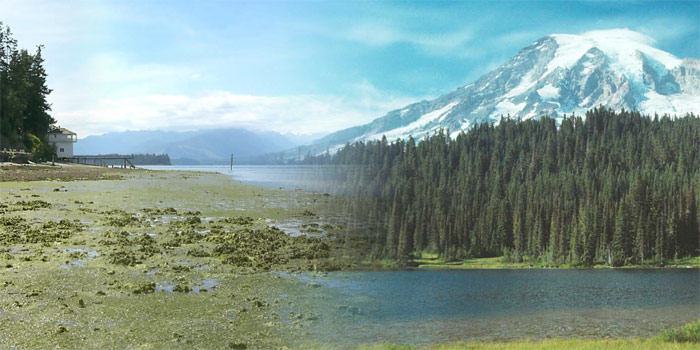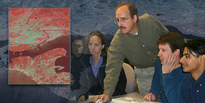Oceanography-Environment 260

The Puget Sound Ecosystem
Each fall, PRISM sponsors "The Puget Sound Ecosystem," Oceanography 260, cross-listed with the Program on the Environment. The class provides an overview of what is scientifically known about the ecosystem and the policy and management challenges of regional conservation in the face of ongoing population growth and climate change. Like the PRISM program, the course defines the "ecosystem" as the marine waters of Puget Sound and the surrounding lands that form its watershed from summit to sea. Also like the PRISM program, the course treats science and policy in an integrated, interdisciplinary fashion that may be unique within the University of Washington.
Co-taught by John Lombard, author of Saving Puget Sound: A Conservation Strategy for the 21st Century, and PRISM Director Jeff Richey, the class has no prerequisites and satisfies UW credits for the Natural World or the Individual and Society. It has proved popular, with enrollment capped at 88 in fall 2009 based on limitations on TA resources. Given the strong regional attention currently being paid to Puget Sound, as demonstrated by the Puget Sound Partnership, together with increasing student interest in interdisciplinary environmental studies, we anticipate the class reaching larger enrollments if more TA resources are available in the future. Students come from a wide range of backgrounds: not just the sciences and policy but art, business, engineering, and many other fields.
Lombard, who manages applications for PRISM (serving as a liaison to potential user groups and agencies around the region), is responsible for Section A, the three-credit lecture series, while Richey is responsible for the optional Section B, which offers both labs and field trips for two additional credits. Each year, guest speakers have been brought in to discuss the real-world, practical choices involved in trying to manage human impacts on the ecosystem. Guests have included: David Dicks, Executive Director of the Puget Sound Partnership; Steve Sakuma, Skagit Valley farmer and member of the Puget Sound Partnership Leadership Council appointed by the governor; Kathy Fletcher, Executive Director of People for Puget Sound; and Dan Stonington, Conservation Policy Director, Cascade Land Conservancy. Lombard also brings real-world experience to the class, both from his work at PRISM and from previous work in local government and consulting.
The course applies material derived from a wide range of PRISM-supported research activities, including mapping of the basin, meteorology and hydrology of the watershed, salmon biology, the River History Project, and oceanography of the marine waters with emphasis on Hood Canal. The optional B section exposes students to some of the technical tools that PRISM employs, such as Geographic Information Systems (GIS) and hydrological, biological, and oceanographic models of the Puget Sound basin. In 2009, Section B field trips included an overnight cruise on the UW's research vessel, the R/V Thomas G. Thompson, where data was collected at PRISM research stations.
Over the quarter, topics covered include:
- Introductions to forest, river, and estuarine ecology
- What is the "State of the Sound"?
- Priority conservation areas in the region
- Conservation challenges from population growth, climate change, and invasive species
- Economic subsidies for environmental degradation
- The Cascade Agenda for central Puget Sound
- Alternative futures processes to address multiple goals and challenges across the region

